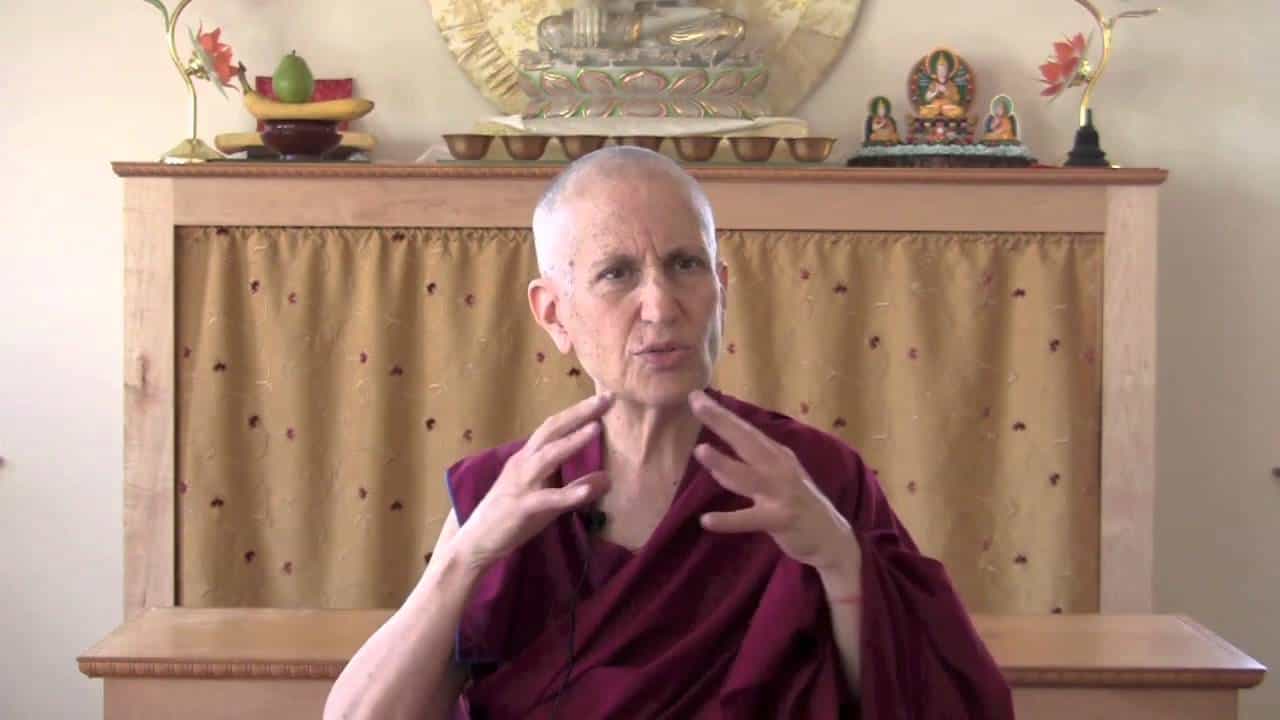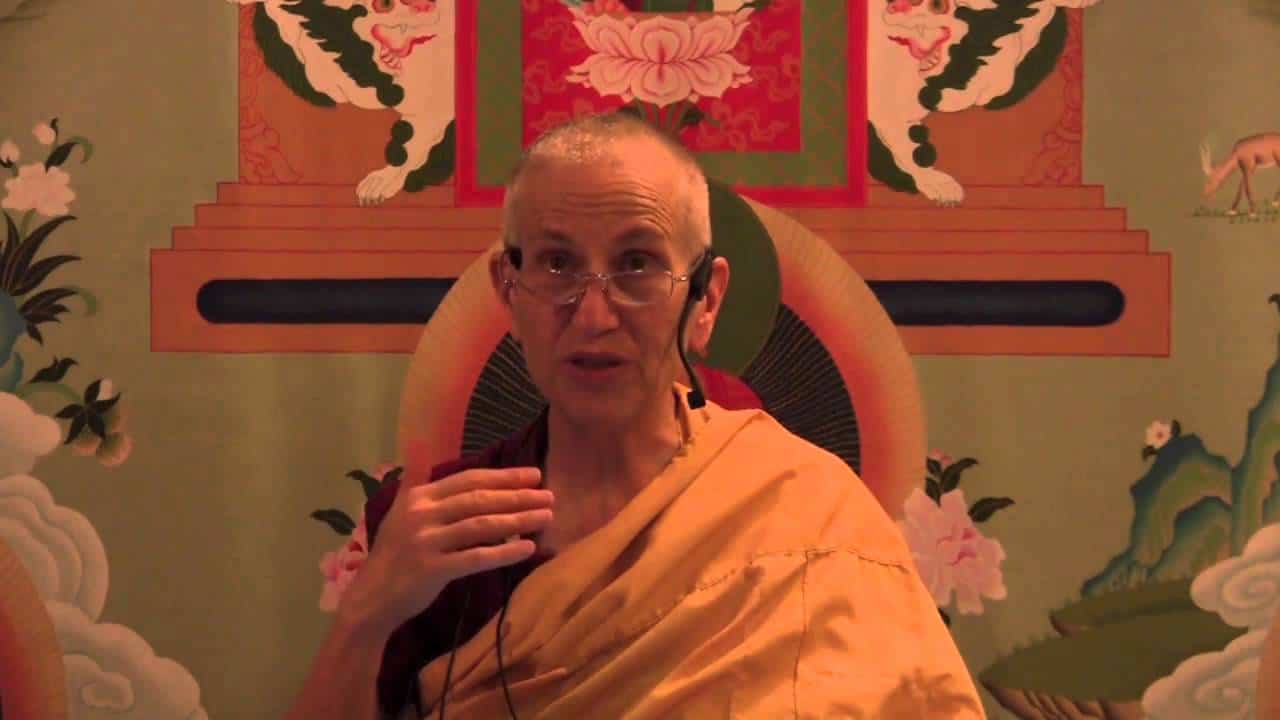Making wise decisions
Part of a series of teachings on the text The Essence of a Human Life: Words of Advice for Lay Practitioners by Je Rinpoche (Lama Tsongkhapa).
- The options when making decisions
- Deeply reflecting on karma
- The downfalls of retaliating
The Essence of a Human Life: Making wise decisions (download)
If what you do brings on suffering eventually,
though it may appear in the moment as happiness,
then do not do it.
After all, food beautifully cooked but mixed with poison
is left untouched, is it not?
Here’s something about making decisions. There are four options: there’s doing something that brings happiness or benefit now, and there’s doing something that brings happiness and benefit in the future, compared with their opposites. So, four possibilities.
For sure if something brings benefit now and in the future, do it.
And for sure if something doesn’t bring benefit now and doesn’t bring benefit in the future, don’t do it. Here when we’re talking about the future meaning future lives and talking about the karma we created and what kind of result from the karma we’ll get.
Now the question comes, if something brings us unhappiness now, but it’s something virtuous that will bring us happiness in the future, should we do it? Yes, we should, because future lives are longer and temporary happiness lasts 30 seconds, it’s there, it’s gone, so no use running after the temporary happiness at the expense of giving up happiness in the long term, in future lives.
But what do people usually do? We do the other alternative, which is if it brings happiness now but pain in the future we’ll do that. This is called being stupid. [laughter] But it’s what we do because we are so addicted to happiness now that we are willing…. Well, we don’t even think about the long-term results of our actions, what results will come in the next lives.
We may talk a lot about karma, but when it comes to making a decision where we have to sacrifice our immediate pleasure in order to create virtue for something good in the future, or for liberation and awakening, we don’t want to give up our temporary pleasure. We make the choice: “Yes, my temporary pleasure, and suffering in the future, we’ll just deal with that when it comes, because it may not even come.” Because inside, although we talk about how we believe in karma, in here (our heart) we’re not sure if we believe in karma or not. Or we kind of believe, but karma’s going to be different for us, like all our small things, we’ll just purify them afterwards, yes? No problem.
I look at this, not only how if affects us on an individual level with our individual decisions, but also as nations. Like in the present situation, after the attacks in Paris…. For some reason people think that looking tough and retaliating is the best way to go, otherwise you’re going to be stepped on. There’s no thought at all about future lives for most of these people because they don’t believe in rebirth. But even for the future 10 years down the line, or even five years down the line, there’s no thought about if we do this action, what kind of result it’s going to provoke five or 10 years down the line.
Now, after the Iraq war we see what was the result of rushing into a war with a lot of feeling of “we’re going to retaliate, and we’re democracy’s savior,” and it made it worse. I don’t see the Iraqi people being any happier than they were under Saddam Hussein. I don’t know, the life of the average person, I don’t think it’s any better than it was under that dictator, as harsh and brutal as he was. But how many people have gotten killed in the meantime? And how much violence has it engendered towards the West as a result of the Iraq invasion?
Thinking about this too in terms of the response to the Paris attacks, looking tough. It’ll get you somewhere because you look like the big bully on the playground. But what’s going to be the long-term result of that? I don’t think people are really thinking about that.
I was quite happy, actually, when Obama said that he didn’t see a mass bombing of ISIS as something good unless we’re willing to have a long-term occupation of Iraq, and Syria too, both of them. Who wants a long-term occupation of Syria and/or Iraq? Second of all, would it be even possible to have a long-term occupation? Third, would it make anything better at all? Or would it just incite more civil war, as what we’ve seen after the occupation in Iraq?
We see in our political world this willingness to do what seems will make you popular or big or look strong at the beginning, but in the long term we haven’t really thought about the results. How do you create a safe society in these places after it’s been bombed and destroyed?
Similarly, from the side of ISIS, they’re also not thinking what are the long-term results of their actions. They just want to, again, look big, look strong, project their misunderstanding of Islam out into the world without thinking of the long-term results for the people who are stuck as the people living under that regime. Not thinking at all.
This advice here, what he said:
If what you do brings on suffering eventually,
though it may appear in the moment as happiness,
then do not do it.
After all, food beautifully cooked but mixed with poison
is left untouched, is it not?
Whether it’s in a national level, a group level, or our own individual level, not to be drawn in by the immediate pleasure that’s going to come at the expense of long-term good.
You can really see how difficult this is. In many areas of health the doctor will give people instructions on how to care for their bodies, and because they see following those instructions as not bringing them the immediate pleasure they want, they ignore the instructions and then suffer from a lot of disease and injury later on.
We need to really think, because the immediate vision of this life is so entrancing that we have a hard time overlooking it, but it would certainly be to our benefit to think long-term.
Venerable Thubten Chodron
Venerable Chodron emphasizes the practical application of Buddha’s teachings in our daily lives and is especially skilled at explaining them in ways easily understood and practiced by Westerners. She is well known for her warm, humorous, and lucid teachings. She was ordained as a Buddhist nun in 1977 by Kyabje Ling Rinpoche in Dharamsala, India, and in 1986 she received bhikshuni (full) ordination in Taiwan. Read her full bio.


